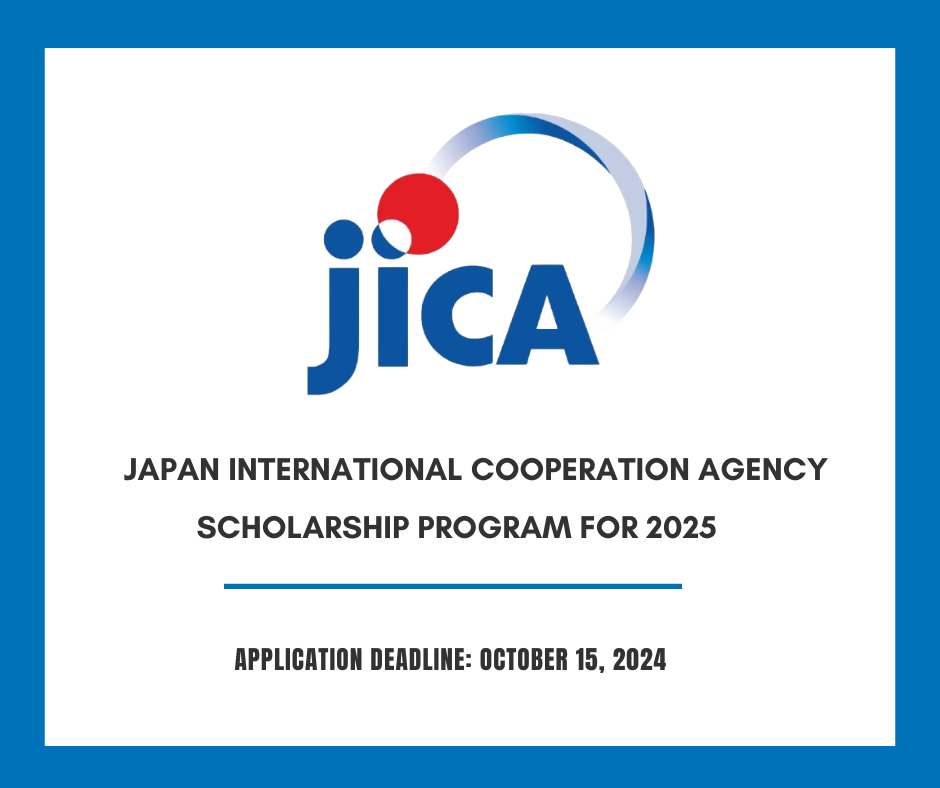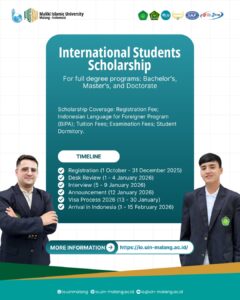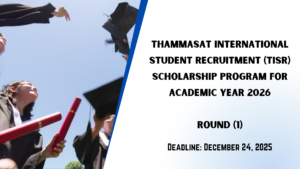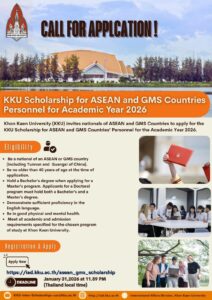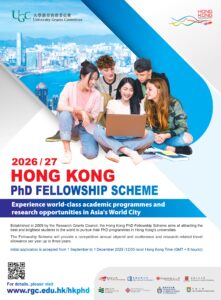General Information on Agriculture Studies Networks for Food Security (Agri-Net) JFY2025
This handout provides an overview of the “Agriculture Studies Networks for Food Security (Agri-Net)” program/course, which is one of the Japan International Cooperation Agency (JICA)’s Knowledge Co-
Creation Program (KCCP) (Long-Term). The program will be implemented as part of the Official Development Assistance of the Government of Japan based on bilateral agreement with respective
governments.
The objective of the Knowledge Co-Creation Program (Long-Term) is to offer opportunities to people
from partner countries to study at higher educational institutions in Japan and to help them build their
network. This is intended to assist in the human resource development plans of the governments of
partner countries and Japan, and eventually to expand and strengthen bilateral ties between the
partner countries and Japan.
Background
What is JICA Knowledge Co-Creation Program (KCCP)
The Japanese Cabinet released the Development Cooperation Charter in June 2023, which stated, “In its development cooperation, Japan has maintained the spirit of jointly creating things that suit partner countries while respecting ownership, intentions and intrinsic characteristics of the country concerned based on a field-oriented approach through dialogue and collaboration. It has also maintained the approach of building reciprocal relationships with developing countries in which both sides learn from each other and grow and develop together.” JICA believes that this ‘Knowledge Co-Creation Program’
will serve as a foundation of mutual learning process.
What is JICA Development Studies Program (JICA-DSP)
JICA-DSP is being carried out by JICA as part of official development assistance (ODA) by the government of Japan. JICA-DSP is offered for international scholars accepted as the participants of JICA’s Human Resource Development Project who are enrolled in a degree program at a Japanese university.
https://www.jica.go.jp/dsp-chair/english/dsp/overview/index.html
What is Agriculture Studies Networks for Food Security (Agri-Net)
In 2019, JICA sets 20 thematic strategies for global issues as JICA Global Agenda*. Under this agenda, JICA will comprehensively contribute to the achievement of the SDGs (Sustainable Development Goals) by 2030 as well as realize Japan’s Development Cooperation Charter which focus on “strengthening socioeconomic autonomy and resilience, including food and energy security”, “digital transformation (DX)”, “quality infrastructure”. Regarding agriculture sector, the Goal 2 of the SDG aims to “End hunger, achieve food security and improved nutrition, and promote sustainable agriculture”. It will require adequate agricultural policies and introductions of appropriate technologies for stable food production.
In this context, the Agri-Net Program aims to support the Goal 2 of SDGs and two strategies in JICA’s Global Agenda (No.5 Agriculture and Rural Development (Sustainable Food Systems) through JICA’s Human Resource Development Projects in the field related to System, Policy and Organizations on Agriculture and Rural Development Sector; Sustainable Agriculture Production; Food Value Chain (FVC); Livestock Development and Animal Hygiene; Fisheries Development.
1. Overview
JICA has provided training programs as a part of technical cooperation in various fields. To strengthen networks between the target countries (Appendix 3) in respective fields, JICA established a new long-term training program to foster young / mid-career bureaucrats, academicians, and leading human resources in various fields of target countries who are capable of influencing policy making processes in their countries or contributing to socioeconomic development in the near future. Agri-Net Program was established in JFY 2019under the framework of JICA Development Studies Program (JICA-DSP) for the purpose of promoting cooperation of sustainable development in the world. JICA has set JICA’s Global Agenda in 2022 to promote sustainable and inclusive agricultural and rural development and stimulating agriculture (including fisheries and the livestock industry) and related industries (such as processing and distribution), JICA aims to eradicate poverty in rural areas through increasing farmers’ income and revitalizing rural economies, as well as to ensure food security through the stable production and supply of food setting 4 prioritized clusters as follows;
(1) Smallholder Horticulture Empowerment & Promotion (SHEP)
(2) Strengthening Food Value Chain (FVC)
(3) Coalition for African Rice Development (CARD)
(4) Promotion of Fisheries-centered Blue Economy, Sustainable Livestock Development
toward One Health
2. Objectives
(1) To develop human resources of public and private sectors under JICA’s Global Agenda related to Agriculture and Rural Development Sector.
(2) To Strengthen a human network between partner countries and Japan in the above- mentioned field.
3. Course Outline
The course consists of the acceptance of participants from target countries to study at Japanese universities in the following fields.
(1) (1) to (5) listed in “one. Overview” (to be prioritized during the selection process)
(2) Others (System, Policy and Organizations on Agriculture and Rural Development Sector)
- Please see Appendix 4. for the detail.
4. Duration
In principle, 2 years for master’s course and 3 years for Ph.D. course (depending on the 4 program offered by universities). The participants should arrive in Japan in September 2024 to start degree courses.
Course Duration:
For master’s degree: September 2025 –September 2027 (2years)
For doctor’s degree: September 2025 – September 2028 (3years)
Note 1 (Research Student):
- As a result of the matching, if the university judges the applicant that they need more time to
prepare for entrance examination, university may request the applicant to enter the university as
a research student for a period of six (6) months at longest. This period is additional and not
counted as a part of regular course of Master’s or Doctor’s program. Research students are
requested to stay in Japan and study intensively to utilize their time to prepare for the entrance
examination. - Before application, the applicants should consider the possibility of additional period as research
students and should be approved by belonging organization. - Necessary living cost during the period as research students will be paid by JICA following JICA’s
regulation. - In case research students fail in the entrance exam, they MUST return to their home countries
without delay (Agri-Net Program scholarship will be terminated at that moment).
Note 2 (Longer Duration): - Some university set more than 3 years for doctor’s course, please check admission information
universities that you intend to apply. - If so, be sure to obtain permission of your belonging organization to leave in that period.
5. Number of Participants
31 participants in total from the target countries.
(Maximum 10 participants allowed for Ph.D. courses)
*Currently, the needs survey for FY2024-2026 is being conducted. It is necessary that your country is selected as a target country through this needs survey.
*Please note that for the Agri-Net Program, which aims to develop human resources in the public and private sectors based on JICA’s Global Agenda, JICA may prioritize applicants whose research interests are strongly related to the six fields mentioned above, those who have participated JICA’s Knowledge Co-Creation Programs and those who are related JICA’s technical cooperation projects.
6. Language to be used in this Program
English
7. Eligibility
Applicants must satisfy the following requirements:
(1) Current Duties:
young or mid-career government officials, prospective academics, or personnel from private institutions who are expected to contribute policy formulation or its implementation for tackling sustainable developmental issues in respective fields.
*Applicants from private sector should be from the field related to System, Policy and Organizations on Agriculture and Rural Development Sector; Sustainable Agriculture Production; Food Value Chain (FVC); Livestock Development and Animal Hygiene; Fisheries Development and Resources.
(2) Nationality:
citizen of the target countries for Agri-Net program JFY2025
(3) Working experiences/ status:
- to have working experiences more than five (5) years in total,
- to have more than six (6) months working experience at their current belonging
organization. , - to obtain permission for application from their current belonging organization,
- to secure reinstatement from their current belonging organizations.
(4) Age:
➢ for master’s programs, thirty-five (35) years of age or under in principle (As of April 1st
, 2025)
➢ for Ph.D. programs, forty (40) years of age or under in principle (As of April 1st, 2025).
(5) Educational Background:
➢ for master’s programs, a bachelor’s degree, or master’s degree holder
➢ for Ph.D. programs, a master’s degree holder
(6) Language:
adequate English skills both in written and oral communication to complete master’s
and/or Ph.D. courses with skills equivalent or exceeding the following.
TOEFL iBT: 90, IELTS: 6.5, CEFR:B2, DET(Duolingo English Test): 120 - Applicants to Agri-Net program are required to demonstrate official results of the English language proficiency test (such as TOEFL, IELTS, TOEIC and Duolingo) at the moment of the application.
(7) Physical Presence:
must physically come to Japan to carry out research activities to complete this program.
(8) Gender Equality and Women’s Empowerment:
Women are encouraged to apply to the program. JICA makes a commitment to promote gender equality and women’s empowerment, providing equal opportunity to all applicants
regardless of sexual orientation and gender identity.
(9) Others:
・must not be receiving nor plan to receive other scholarship during the program.
8. Admissions
The following selection steps will conduct for admission.
(1) Applicants must be selected as JICA’s official candidate through JICA’s internal selection
procedure.
(2) The candidates must pass the general entrance examination of the university they have applied to, including examinations to enter the applicants’ desired master’s degree or Ph.D. degree course1
(3) JICA will finalize successful candidates from those who passed the university’s exam.
9. Application Guidelines
Applicants must apply through the procedures as described below, which are necessary requirements by both applicant’s Government and the Government of Japan for the Official Development Assistance.
(1) Applicants are required to submit ALL the “Application Documents2 ” listed below to JICA overseas office in charge of the applicants’ countries. ALL application documents are required at the moment of the application.
1) Letter or Note Verbale from your government.
- If it is difficult to obtain it, JICA requests to fill and sign for the confirmation by the responsible organization in charge of ODA in “Official Application Form”
2) Application Form for Agri-Net Program JFY 2025 (Please fill out Appendix 2 and 3).
3) Graduation certificate - Officially certified copies of the original
- Written in English or accompanied with official translation
4) Academic transcript - Must contain all the grades earned at the university attended by the applicant
- Officially certified copies of the original transcript
- Written in English or accompanied with official translation in English
5) Photocopy of certificate of English Proficiency Test
i. ALL applicants to Agri-Net Program are required to demonstrate English language
proficiency by submitting official results of TOEFL (Test of English as a Foreign
Language), IELTS (International English Language Testing System) or Duolingo.
However, some universities do not acknowledge / accept all these tests, applicants
are requested to confirm with the university they apply to.
ii. Adequate English skills both in written and oral communication to complete
master’s and/or Ph.D. courses with skills equivalent or exceeding the following.
TOEFL iBT: 90, IELTS: 6.5, CEFR B2, DET(Duolingo English Test)120
iii. Exemption from English proficiency test
The English proficiency test requirement is waived for applicants who meet one of the following criteria:
✓ have completed or are completing their Bachelor’s or Master’s program that are taught entirely in English in one of the following countries*
✓ have been working for full-time in a professional or academic environment where English is used at least three years in one of the following countries*
*Countries: Australia, Canada, Ireland, New Zealand, South Africa, USA, UK
6) A copy of Valid ID or Passport with photo (to confirm nationality, name, sex, and date of
birth).
- Certified English translation must be attached if ID is not written in English, French, Portuguese, or Spanish.
7) Two (2) ID photos (4cm × 3cm, within 6 months before the application date) pasted on application form (Original and copy)
8) Health certificate (when the participant applied to the entrance examinations or within 6 months before arrival in Japan, whichever is later
Applicants without a health certificate may be denied admission.
JICA shall determine whether the candidate is eligible to participate in training in Japan.
JICA shall make a decision on acceptance or rejection based on several factors such as
entrance examination results, planned number of participants, medical examination results
and others. Reason for the decision will not be disclosed.
10. Expense to be Borne by JICA
Under the JICA Long-term Participants Allowance standards, JICA will cover expenses and allowance to participants accepted to the program/course. See the table below for further details. Note that the payments (e.g., for tuition, research support expenses, school support expenses) will not be paid to the accepted participants themselves, but directly to the university or other relevant institutions.
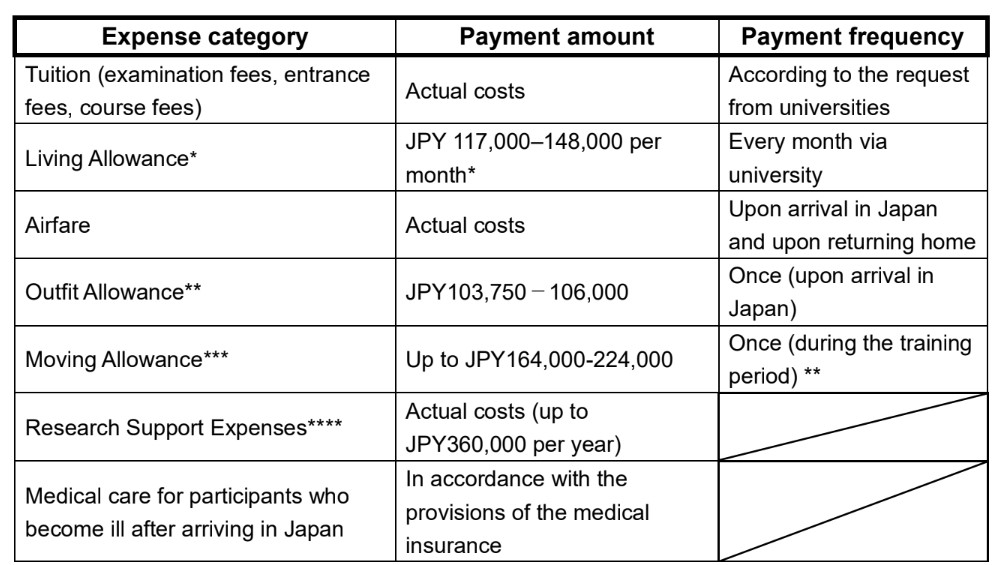
11. Expenses Not to be borne by JICA
JICA will not bear costs other than the allowances described above. JICA is not responsible for the following expenses especially:
(1) Passport fees (for re-issuance and extensions, etc.)
(2) Visa fees of a transit country and transportation expenses to obtain Visa
(3) Transportation expenses to obtain Japanese Visa
(4) Domestic travel expenses at the applicant’s home country
(5) Departure tax
(6) Airport tax/airport facility charges outside of Japan, including third countries
(7) Customs duty
(8) Excess baggage charges
(9) Compensation for lost and/or damaged baggage
(10) “No show charge” to the transit airport hotel (non-refundable)
(11) Lost – ticket fee
(12) Accommodation fee for day-use hotel in return flight
(13) Transportation expenses other than official programs
(14) Telephone bill or mini-bar tab at accommodation
(15) Medical costs related to pre-existing illness, pregnancy, and dental treatment
(16) Medical cost related to the same illness over 180 days
(17) “National Health Insurance” fee
(18) Cost of postage
(19) Cost for obtaining such English score
(20) Other cost which is not listed in 11.
Note: If participant/accepted applicant does not follow the regulation of JICA, the participant
may have to bear such other cost of necessary expenses.
12. Conditions for participation
Applicants for Agri-Net Program are required :
(1) to understand that participants must physically come to Japan to participate in this program at the date designated by JICA (therefore successful applicants should apply for permission from their home country and for a passport as soon as possible),
(2) not to be receiving nor plan to receive another scholarship during the program including other JICA KCCP (long-term) at the same time.
(3) to understand that, if you will be accepted as a “research student”, attendance to additional six months course will be required to prepare for the entrance examination of the university. And permission to leave for additional six (6) months from the current belonging organization may be necessary, if required by the university. (this period will be additional to two years of master course or three years of doctor course). And if you fail in the entrance exam, you must return to their home country without delay (Agri-Net program ends at that moment).
(4) to enroll and complete JICA-DSP online courses when you receive JICA’s instructions to do so.
(5) to be examined who are enlisted in the military or other military-related organizations will be screened for conformity with Japan’s Charter on Development Cooperation, taking into account the totality of their duties, status in the organization, and other relevant information.
(6) not to change course subjects or extend the course period,
(7) to understand that the maximum duration of “Overseas research” and “Temporary Leave (leaving Japan for private purpose)” is 60 days, in principle,
(8) to carry out such instructions and abide by such conditions as may be stipulated by both the nominating Government and the Japanese Government in respect of the course,
(9) to observe the rules and regulations of the program implementing partners to provide the program or establishments (“Plagiarism“ especially is taken severely by enrolling university, regardless of whether it is direct plagiarism or self-plagiarism and participants may be subject to disciplinary action such as suspension),
(10)to observe the rules and regulations at the place of the participants’ accommodation,
(11)to understand that inviting participant’s family members is not recommended before 6 months since their arrival in Japan,
(12)not to engage in political activities, or any form of organization for profit,
(13)not to drive a car or motorbike, regardless of an international driving license possessed,
(14)to participate in the doctoral program of JICA’s program immediately after completing the master’s program of JICA’s program will be reviewed the necessity for their program and make a comprehensive decision by JICA.
(15)to agree to be discontinued of the program, should the participant (a)violate Japanese
laws, JICA’s regulations, or University’s regulations, (b)commit illegal or any type of immoral conduct including sexual harassment, (c)become critically ill or seriously injured 14 after arrival in Japan.
(16)To be responsible for paying any cost for treatment of the said health conditions except for the medical care expenses described in the table of “11. Expenses To be borne by JICA,”
(17)not to change the air ticket (and flight class and flight schedule arranged by JICA) and lodging by the participants on their own,
(18)to return to their home country on the designated flight by JICA, when they finish the program/course or when it is deemed impossible to finish the program within the program period (i.e., bad behavior, academic failure, violating the laws and ordinances), or when the participant is not successful on the regular course examination,
(19)to refund allowances or other benefits paid by JICA in the case of a change in schedule,
(20)to return the total amount or a part of the expenditure for KCCP depending on the severity of such violation, should the participants violate the laws and ordinances.
(21)to be in good health and to be with good (sensible) sense to participate in the program,
(22)to submit a Health Certificate in JICA format at the participant’s expense, when the participant applied to the entrance examinations the entrance examinations or within 6 months before arrival in Japan, whichever is later.
(23)to accept to submit a second Health Certificate in JICA format if the participant will not be able to arrive within 6 months from the date of his/her first medical examination. The cost of the Health Certificate will be borne by participants,
(24)to promptly resubmit your medical history, If there are changes in your health condition, such as pregnancy or a pre-existing disease,
(25)to accept to take tuberculosis related inspections organized by JICA after arriving in Japan and to submit the results to JICA and university.
(26)to understand not to make other applications for different JICA training courses at the same time.
(27)to approve the following conditions on summary of my thesis;
(A) Summary of the thesis shall be kept at JICA.
(B) Summary of the thesis can be read by anyone who made a request to JICA .
(C) Summary of the thesis can be used for publication by JICA or JICA website.
(D) Taking Photocopy of the thesis shall be allowed by anyone with JICA’s permission.
the undersigned,
For more information:
https://www.jica.go.jp/english/overseas/samoa/Application_Forms/Agri_Net_for_Food_Security/2025.html

